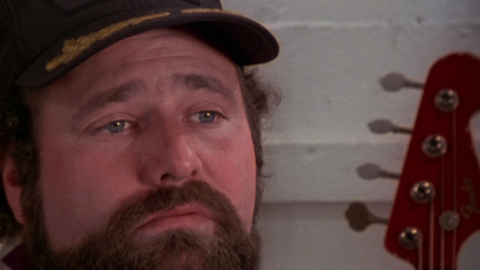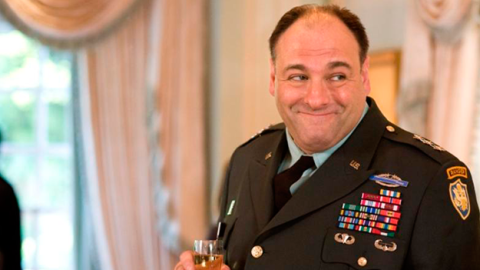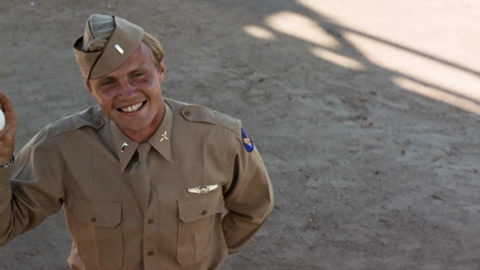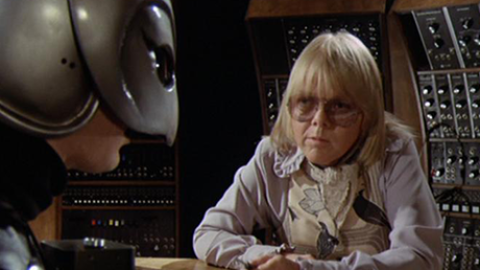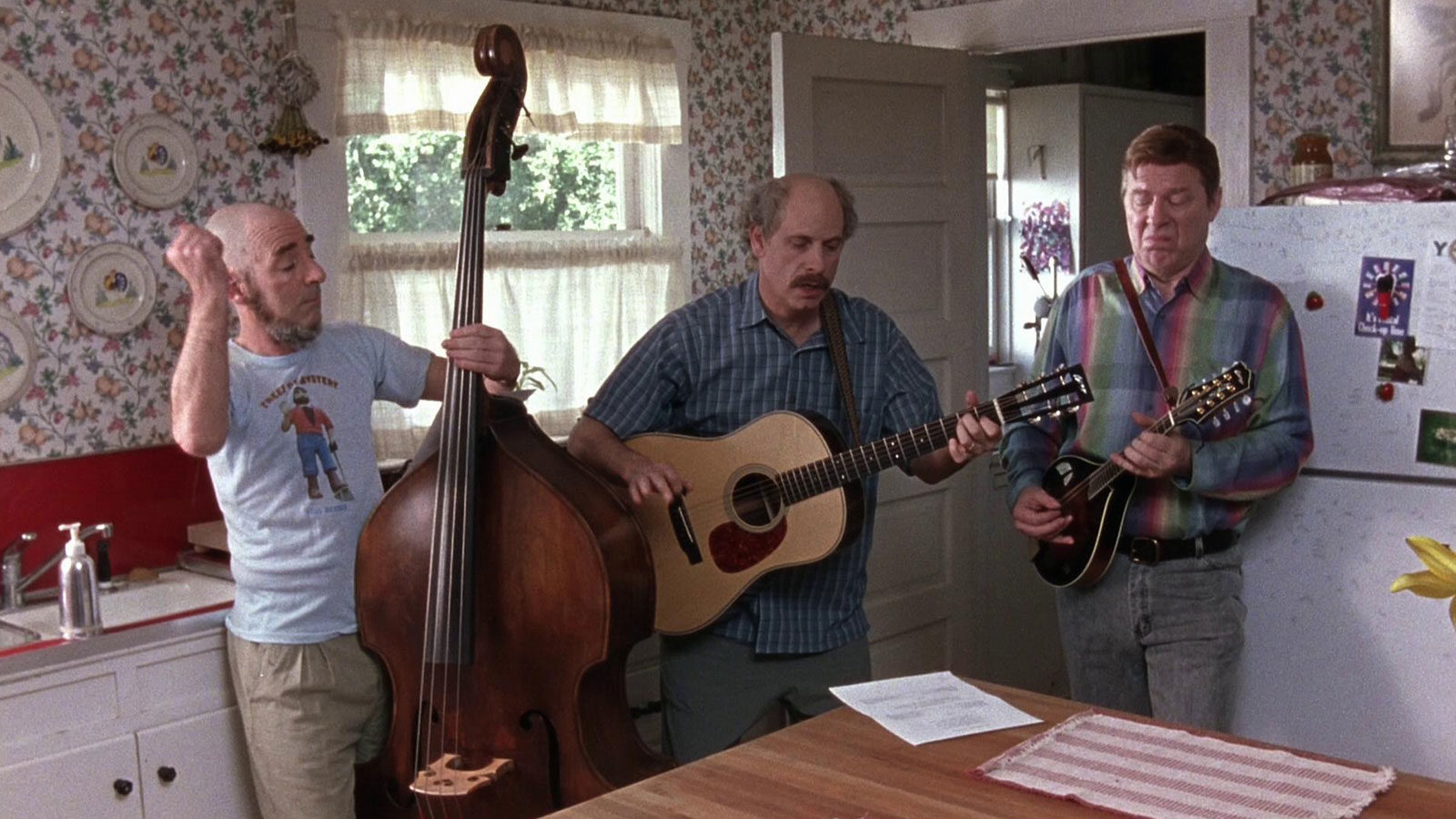
All in the Family
Christopher Guest’s group improvisational comedies cover a lot of standard territory—bumpkins and fools, foppish homosexuals, hopeless provincials, vainglorious showbizzers—and their faux-documentary style has become pervasive since the days of This Is Spinal Tap! Yet they’re notable for their devotion to left-field behavior, their behavioral nuances and grace notes, and the spirited nature of their comic attack. The firm of O’Hara, Levy, Willard, Posey, Shearer, McKean, Higgins, Balaban, Begley, Lynch, and Coolidge, not to mention senior partner Guest himself, can be counted on to spin almost anything into comic orbit, but their laugh quotient is equaled by the originality of their thinking and story sense, at all levels. Eugene Levy’s Mitch Cohen in A Mighty Wind (03) is a creation so carefully considered and rendered as to make Mike Leigh envious, and Catherine O’Hara’s Marilyn Hack in For Your Consideration is a jaw-dropper, flying kamikaze-style into one of the scariest fixtures of celebrity culture. NASCAR, male models, and middle-aged narcissism are fairly obvious satirical targets. Closeted amateur theatrical directors in the sticks, the dog show circuit, and aging folkies are not.
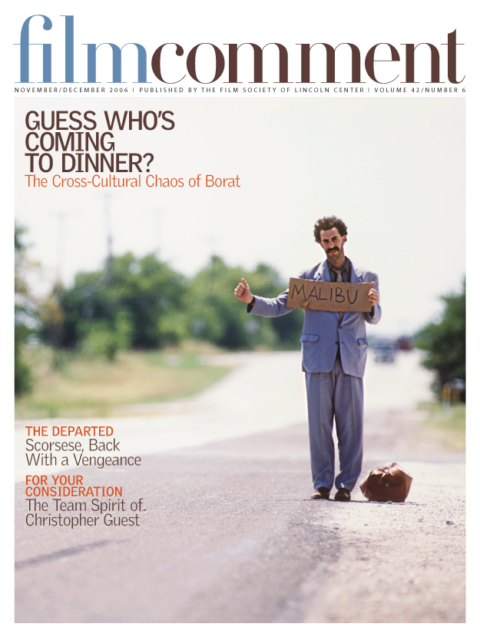
As entertaining as the Ben Stiller-Will Ferrell-Owen Wilson movies are, they’re dogged by a tiring self-satisfaction and showboating. This is a Saturday Night Live hangover, and it’s the element that always made that institution less gutsy or memorable than SCTV. By the time Ferrell gets to his flaming jazz-flute routine in Anchorman, the self-conscious calculation has reached danger levels, and each “original” retro move has been laid out for the audience like a line of steam trays at an all-you-can-eat buffet. Like SNL when they started to devote 90 percent of their airtime to game-show send-ups and celebrity impersonations, every choice appears to have been triple-checked by a staff of hundreds for comfort levels, digestibility, and ersatz transgressability. Meanwhile, the uptight quality of Ferrell’s acting betrays a level of anxiety about pleasing the audience that tends to defuse his comedy. Stiller usually manages to break through the layers of anxious calculation with his amazing brio (no one is better on male vanity). Nonetheless, like Ferrell, he’s too often saddled with Carrey-ish, action-figure-ready conceptions.
By contrast, Guest and crew are less interested in being number one than in creating viable characters who suffer real disappointments and setbacks. The Waiting for Guffman team, the Best in Show contenders, the Mighty Wind musicians, and the cast of Home for Purim in For Your Consideration are believably deluded, each one’s grandiose dream of media-soaked fame and riches made plausible by virtue of a nice insight: they all imagine they’re doing a great job of keeping their feelings under wraps. This is the Guest frisson—proclamations of modesty betraying a burning desire to trump everyone in sight and finally make the big score. It’s not that Guest and company don’t rack up plenty of easy laughs, most of them predictably revolving around sexuality—Guest’s absent “wife” in Guffman, O’Hara’s former good-time waitress in Best in Show, Fred Willard’s penis enhancement in Guffman. But the heart of these films is the all-too-human delusions of their characters. Bob Balaban as the dutiful organizer of the folk reunion in A Mighty Wind, speaking modestly but barely cloaking his essential loftiness; the Guffman cast trying and failing to hide the fact that they’ve already written and rehearsed their Tony Award speeches a thousand times in their heads; O’Hara’s Marilyn and Harry Shearer’s Victor Allen Miller making a big deal of the fact that they’re unconcerned about their Oscar worthiness, while the lights of fame grow ever brighter behind her twinkling orbs and his desperate smile.
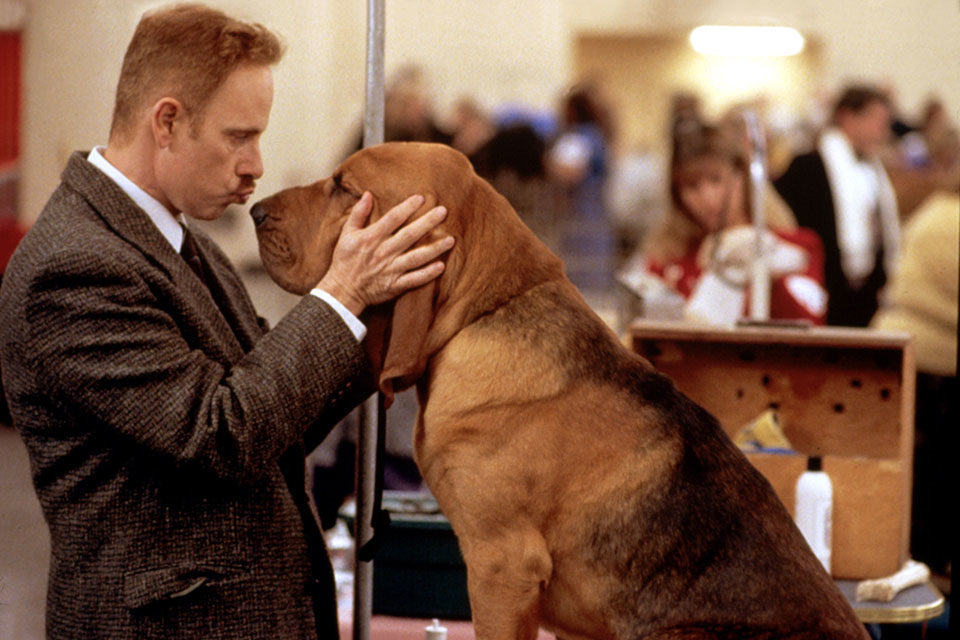
Best in Show
Winning and losing big is an all-American subject, and it runs through some of the richest veins in comedy: Lloyd, Sturges, The Honeymooners, Rodney Dangerfield, The King of Comedy. Guest has been tuned to this wavelength right from the start, with Spinal Tap and its array of downward reversals and turnarounds (and remember his priceless SNL short with Shearer and Martin Short as synchronized swimming brothers looking to score at the Olympics?). His first film, The Big Picture, like For Your Consideration, is all about delusions of grandeur in the movie business, and the two movies offer a fascinating study in contrasts. Written off as excessively mild back in 1989, Guest’s feature debut may have its shortcomings (the pace is too mechanical, the action a little too fabulous, and prize-winning film-school grad Kevin Bacon’s dream movie doesn’t seem all that personal), but its vision of a world where everyone is cut down to size with smiles and yeses is pitch-perfect, particularly in the scenes with J.T. Walsh’s studio exec (“Instead of two guys and a girl, how about two girls? There’s something about two girls together…”), and on close examination it’s much sharper than most inside-Hollywood movies. A shaggier and more winningly homemade affair, For Your Consideration nonetheless gets the same cuttingly acrid quality, particularly in the scenes with Ricky Gervais’s financier (“We love the Jewishness—maybe we should just tone it down…”). Yet, 17 years and an increasing commitment to improvisation aside, what separates The Big Picture from For Your Consideration is the sense of real-life desperation. When Walsh’s exec is purged and Bacon’s deal goes south, the young director falls back on a cushion of outcast camaraderie with his stridently kooky film school pal (Jennifer Jason Leigh, in a performance that suggests a permanently sprung gyroscope). For the misbegotten almost-resurrected stars of Home for Purim, there’s nothing but humiliation and a return to uncertainty, with rictus smiles surgically or chemically pasted on their sorry faces.
Team Guest has a real understanding of loneliness, bad luck, missed chances, and elusive dreams. You won’t be hearing cruelty-to-characters complaints leveled at Paul Weitz or David Dobkin, so puppyish are the enterprises in which they’re involved. Aside from the fact that Guest makes films for a small fraction of the promotional budgets of their films, he also cuts much closer to the bone. Parker Posey’s assorted Guest incarnations—Guffman’s Dairy Queen attendant, Best in Show’s neurotic dog owner, one of the newest of the New Main Street Singers in A Mighty Wind, the “earnestly unpretentious” actress in For Your Consideration—are just as fully imagined as her non-comic work, and perhaps even more impressively rough-hewn: the wild grin, the angular face, the brittle physicality and sinewy physique become more pronounced, as does the inherent sadness. Jane Lynch’s perky discussions of her porn-movie experience in A Mighty Wind (“I performed a certain maneuver that other girls were unwilling to do”), like O’Hara’s promiscuous past in Best in Show, are very close to the standard fare of most modern comedies, all of a piece with American Pie’s “flute in my pussy” gag or Carrey’s Me, Myself and Irene dildo shenanigans. The difference is that they’re set within pseudo-doc confessional interludes, voiced by actors who’ve thought through their characters’ self-images and social and economic perspectives with great care. Their tortured husbands sitting beside them (John Michael Higgins and Eugene Levy, respectively), making game but ultimately unsuccessful attempts to summon up worldly airs, deliver the final crushing blows.
It would be a mistake to read high ambition into these amiable, deliberately loose-limbed comedies, or to undercut their success at provoking yuks aplenty from their devoted audiences. We all have our favorite characters and comic inventions (for me it might be the Raging Bull tryout scene in Guffman, or the Mighty Wind title song—“It’s blowing peace and freedom/It’s blowing you and me”). Yet, in the proud tradition of It’s a Gift, Jack Benny, and the Sturges canon, these are movies with a good, tough grasp of modern middle-class types and values and a truly American panic, and their observation of particular types little seen in movies or on TV is remarkable. We’ve had no shortage of closeted gay men in movies, some funny and some not, but no other like Corky St. Clair. It’s not just the bowl cut, the “wife,” or the touching approximation of showbiz sophistication that make him such a memorable creation, but the essential fragility behind his elevated vision of himself: his easily punctured vanity, his apparent belief that his sexual orientation is a well-kept secret. This is Guest’s strong suit as both a performer and a comic filmmaker: the discrepancy between the world as his characters imagine it and the way things are. It gives each of his movies a very special poignancy. The fairly conventional yet sensitively drawn deflation of youthful hubris in The Big Picture has developed throughout the years into a keen appreciation of the way that people get through life by telling themselves tales and filtering out the contradictory parts.
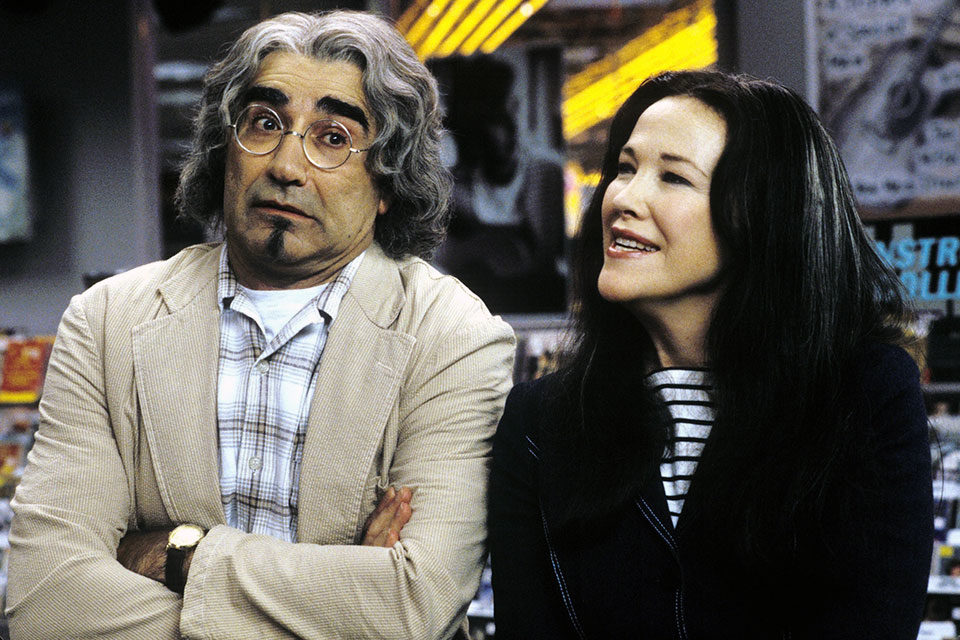
A Mighty Wind
Guest’s democratic cinema has one foot in tried-and-true comic traditions and another in the tradition of actor-based cinema, in which the expressive properties of the film and those of its actors mingle to the point where they’re interchangeable. The parallels with Mike Leigh’s work are fairly evident, and Guest deserves his own place in the Kazan-Duvall-Grosbard lineage. Levy has always been a brilliant performer, and it’s a melancholy spectacle to see the man who invented Sid Dithers and fried Gene Shalit to a crisp on SCTV plying his trade in New York Minute and Cheaper by the Dozen 2. Apart from the fact that he’s the co-author of the Guest comedies, he’s also the generator of some of its most deeply felt creations. “There’s…a deception here,” murmurs A Mighty Wind’s Mickey in a heartbreaking moment, his eyes bugging out at arhythmically spaced-out intervals. “They’re expecting a man who no longer exists.” Levy goes far beyond the folkie Brian Wilson concept and creates both a hilarious caricature and an intermittently moving character. Everything that’s funny is grounded in the reality of a psychically damaged, behaviorally reconditioned folk genius preparing to take the stage with his beloved ex-wife and former partner (O’Hara, equally compelling); by the same token, Levy and Guest’s belief in the material is so sound that the non-comic interludes are just as rewarding as the guaranteed laughs.
O’Hara’s Marilyn is just as startling. For the first half of For Your Consideration, you wonder exactly what she and Guest are up to. Her acting seems unusually low-key, her presence deliberately pallid and haggard, her age accentuated to unstated purpose. When the square publicist (Higgins) lets it be known that Oscar buzz has begun, she does a predictably good, subtle job of concealing her character’s excitement behind a layer of reflexive false modesty. Cut to a few months later, with the Oscar campaign in full swing and the movie’s title changed to Home for Thanksgiving. The second that O’Hara appears, her eyes pinned back, her lips inflated like tires and her skin drawn as tight as a kettle drum, the effect is absolutely startling: the character and the movie explode out of their skins. Liberating, terrifying, and, yeah, pricelessly funny.
Maybe the loveliest quality of these movies is the fact that they’re such winningly democratic ventures. As in the best of Thirties comedy, the uniform anxiety of the characters is outweighed by the team spirit, the feeling of real behind-the-scenes camaraderie. O’Hara and Levy, Posey and Shearer, the magical Fred Willard and the perpetually poised Balaban, and Coolidge and Lynch and McKean and Begley and Guest himself and good old Paul Dooley go darting in and out of the action, sprinkling little comic offerings along the way, all of their characters going down their own lonely roads with their private fantasies running through their heads, but all under the same big tent. These infectiously egalitarian films manage a pretty neat trick. They allow us to laugh at and with their characters at the same time.



